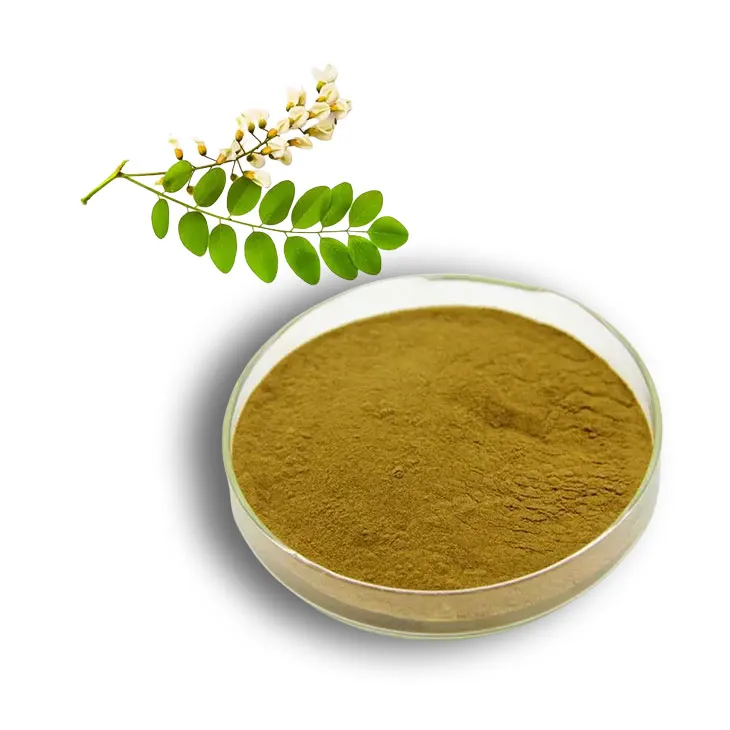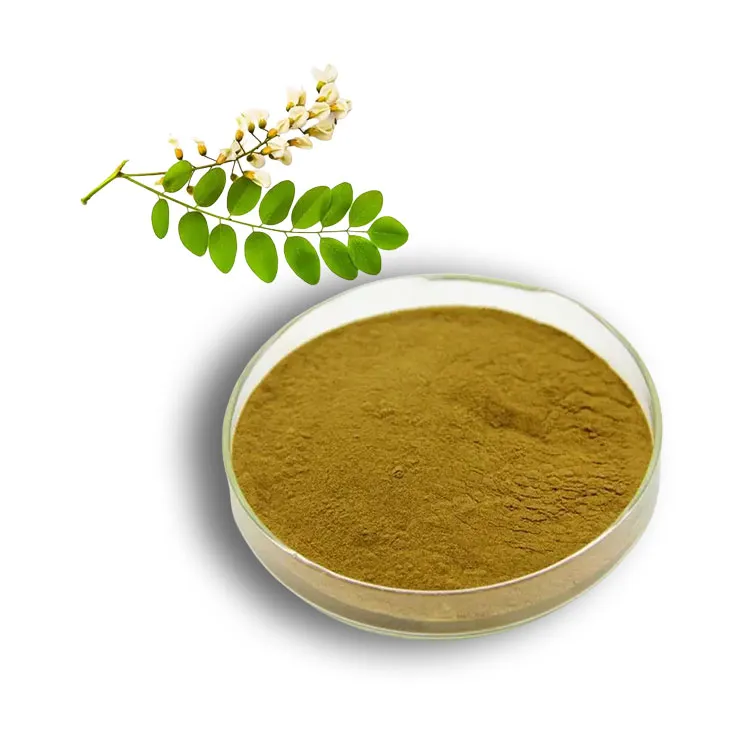- 0086-571-85302990
- sales@greenskybio.com
Sophora japonica flower extract with standard process.
2024-11-30

1. Introduction
The Standard Processed Sophora Japonica Flower Extract is a remarkable natural extract that has attracted significant attention in various fields. The extraction process of the Sophora japonica flower is carried out with precision and standardization to obtain this high - quality extract. Sophora japonica, a plant with rich medicinal value, has been used in traditional medicine for centuries. The flower part, in particular, contains a variety of bioactive compounds that are of great interest for modern applications.

2. Source and Selection of Sophora japonica Flower
The first step in obtaining the high - quality extract is the careful selection of Sophora japonica flowers. These flowers are sourced from healthy plants, often grown in specific regions known for their favorable environmental conditions for Sophora japonica cultivation.
When selecting the flowers, several factors are considered. The stage of flower development is crucial, as different stages may contain varying levels of bioactive compounds. Flowers at the optimal stage of maturity are typically chosen to ensure the maximum concentration of the desired constituents.

3. Chemical Composition
The Sophora Japonica Flower Extract is renowned for its rich chemical composition. It contains a variety of compounds such as flavonoids, alkaloids, and phenolic acids.
3.1 Flavonoids
Flavonoids are a major group of compounds present in the extract. They play important roles in various biological processes. For example, some flavonoids have antioxidant properties, which can help protect cells from oxidative damage. Quercetin, a common flavonoid in Sophora Japonica Flower Extract, has been extensively studied for its antioxidant and anti - inflammatory effects.
3.2 Alkaloids
Alkaloids are another significant component of the extract. These nitrogen - containing compounds often exhibit pharmacological activities. In the case of Sophora japonica flower extract, alkaloids may contribute to its potential medicinal effects, such as its possible impact on the central nervous system or its role in antimicrobial activities.
3.3 Phenolic Acids
Phenolic acids in the extract also have important functions. They can participate in antioxidant reactions and may also have a role in modulating cell signaling pathways. Caffeic acid and ferulic acid are examples of phenolic acids found in the Sophora japonica flower extract.

4. Immune Modulation Potential
One of the most notable aspects of the Standard Processed Sophora japonica Flower Extract is its potential in immune modulation.
The bioactive compounds in the extract can interact with the immune system in multiple ways. For instance, they may enhance the activity of immune cells such as macrophages. Macrophages are key players in the body's immune defense, responsible for engulfing and destroying foreign invaders like bacteria and viruses. The extract may stimulate macrophages to be more efficient in their phagocytic activity.
Furthermore, the extract may also influence the production of cytokines, which are small proteins that play a crucial role in cell - to - cell communication within the immune system. By modulating cytokine production, the Sophora japonica flower extract could help regulate the immune response, ensuring that it is neither too weak (resulting in susceptibility to infections) nor too strong (which could lead to autoimmune disorders).
5. Applications in Pharmaceutical Research
In the field of pharmaceutical research, the Sophora japonica flower extract is being actively explored for its potential in treating certain chronic diseases.
- Cardiovascular Diseases: Some of the bioactive compounds in the extract may have beneficial effects on the cardiovascular system. For example, the antioxidant properties of flavonoids can help prevent the oxidation of low - density lipoprotein (LDL) cholesterol, which is a key factor in the development of atherosclerosis. Additionally, alkaloids may have a role in regulating blood pressure, although further research is needed to fully understand these mechanisms.
- Diabetes: There is growing evidence that the extract may have potential in diabetes management. It could help regulate blood glucose levels by improving insulin sensitivity. The phenolic acids in the extract may be involved in this process, perhaps by influencing glucose uptake in cells or by modulating the activity of enzymes related to glucose metabolism.
- Cancer: Although still in the early stages of research, the Sophora japonica flower extract has shown some promise in cancer research. Some of its bioactive compounds may have anti - cancer properties, such as inhibiting the growth and proliferation of cancer cells. Flavonoids, in particular, have been studied for their ability to induce apoptosis (programmed cell death) in cancer cells. However, more in - depth studies are required to determine its effectiveness and safety as a potential cancer treatment.
6. Role in Traditional Medicine
The Sophora japonica flower has a long - standing history of use in traditional medicine.
In traditional Chinese medicine, for example, it has been used to treat various ailments. It was often used for its heat - clearing and detoxifying properties. Traditional practitioners may have used Sophora japonica flower preparations to treat conditions such as skin diseases, which were thought to be related to "heat" in the body. The flower was also used in some cases for its anti - inflammatory effects, although the understanding of these effects was based on empirical knowledge rather than modern scientific understanding.
In other traditional medicine systems around the world, the Sophora japonica flower may have also been used in different ways. For instance, in some herbal remedies, it was used as an ingredient to promote overall health and well - being.
7. Modern Extraction Techniques and Their Impact
With the development of modern extraction techniques, the Standard Processed Sophora japonica Flower Extract has seen significant improvements in terms of purity and effectiveness.
Modern extraction methods such as supercritical fluid extraction and microwave - assisted extraction have been employed. Supercritical fluid extraction uses a supercritical fluid, usually carbon dioxide, as the solvent. This method has the advantage of being able to extract compounds selectively and under relatively mild conditions, which helps preserve the integrity of the bioactive compounds. Microwave - assisted extraction, on the other hand, uses microwave energy to accelerate the extraction process. It can significantly reduce the extraction time while maintaining a high yield of the desired compounds.
These modern techniques have made the Sophora japonica flower extract more suitable for various industries. Higher purity means that the extract can be used in more precise formulations, especially in the fields of nutraceuticals and herbal remedies, where product quality and consistency are crucial.
8. Applications in Nutraceuticals and Herbal Remedies
In the nutraceutical industry, the Sophora japonica flower extract is becoming an increasingly popular ingredient.
Nutraceutical products are designed to provide health benefits beyond basic nutrition. The extract can be incorporated into dietary supplements, such as capsules or tablets. Consumers are increasingly interested in natural products for maintaining their health, and the Sophora japonica flower extract, with its potential immune - modulating, antioxidant, and other health - promoting properties, fits well into this trend.
In herbal remedies, the extract has been used for centuries in traditional forms. With modern processing, it can now be formulated into more convenient and standardized products. For example, herbal teas or tinctures containing Sophora japonica flower extract can be produced with consistent quality and potency. These herbal remedies can be used for a variety of self - care purposes, such as relieving minor inflammation or promoting general well - being.
9. Safety and Quality Considerations
When dealing with the Standard Processed Sophora japonica Flower Extract, safety and quality are of utmost importance.
Regarding safety, although the extract has a long history of use in traditional medicine, modern safety evaluations are still necessary. Some compounds in the extract may have potential side effects, especially when used in high doses or for long periods. For example, certain alkaloids may have toxic effects if not properly controlled. Therefore, proper dosage determination and safety studies are essential before its wide - scale use in various products.
Quality control is also crucial. This involves ensuring the purity of the extract, the consistency of its chemical composition, and the absence of contaminants. Standardized extraction processes and quality testing methods, such as high - performance liquid chromatography (HPLC) for analyzing the chemical composition, are used to ensure that the extract meets the required quality standards.
10. Future Prospects
The Sophora japonica flower extract has a bright future with much potential for further development.
In the field of research, more in - depth studies are expected to fully understand its mechanisms of action, especially in relation to its potential in treating chronic diseases. This will require interdisciplinary research involving pharmacology, biochemistry, and clinical medicine.
In the industry, as consumer demand for natural and effective health products continues to grow, the extract is likely to see increased use in nutraceuticals and herbal remedies. New product formulations and delivery systems may be developed to enhance its bioavailability and effectiveness. Additionally, as the understanding of its safety profile improves, it may also find applications in other areas such as cosmetics, where its antioxidant and anti - inflammatory properties could be beneficial.
FAQ:
Question 1: What are the main bioactive compounds in Sophora japonica flower extract?
The Sophora japonica flower extract contains various bioactive compounds. Some of the well - known ones include flavonoids, which are known for their antioxidant and potential health - promoting properties. However, further research is still being carried out to fully understand all the bioactive compounds and their specific functions within the extract.
Question 2: How does Sophora japonica flower extract enhance the body's immune system?
The bioactive compounds in the Sophora japonica flower extract may interact with the cells of the immune system. For example, they might stimulate the production of immune cells or enhance the function of existing immune cells. However, the exact mechanisms are still under investigation. It is believed that these interactions can lead to an overall enhancement of the body's defense mechanisms against pathogens.
Question 3: What are the potential applications of Sophora japonica flower extract in the pharmaceutical industry?
In the pharmaceutical industry, Sophora japonica flower extract is being explored for its potential role in treating certain chronic diseases. It could potentially be used in the development of drugs for diseases where immune modulation is beneficial, such as autoimmune diseases or certain inflammatory conditions. However, more research is needed to establish its safety and efficacy for these applications.
Question 4: How has modern extraction techniques improved the Sophora japonica flower extract?
Modern extraction techniques have significantly improved the Sophora japonica flower extract. These techniques can increase the purity of the extract by removing impurities more effectively. They also help in better preservation of the bioactive compounds, which in turn enhances the effectiveness of the extract. This makes the extract more suitable for various applications in different industries such as nutraceuticals and herbal remedies.
Question 5: What is the historical use of Sophora japonica flower in traditional medicine?
In traditional medicine, Sophora japonica flower has a long - standing history of use. It has been used for various purposes, such as for its potential medicinal properties related to health promotion and treatment of certain ailments. However, the traditional uses were often based on empirical knowledge, and modern scientific research is now being carried out to validate and better understand these historical applications.
Related literature
- The Chemical Constituents and Biological Activities of Sophora japonica Flower Extracts"
- "Sophora japonica Flower: Traditional Uses and Modern Research Perspectives"
- "Enhancing Immune Function with Sophora japonica Flower Extract: A Review"
- ▶ Hesperidin
- ▶ citrus bioflavonoids
- ▶ plant extract
- ▶ lycopene
- ▶ Diosmin
- ▶ Grape seed extract
- ▶ Sea buckthorn Juice Powder
- ▶ Beetroot powder
- ▶ Hops Extract
- ▶ Artichoke Extract
- ▶ Reishi mushroom extract
- ▶ Astaxanthin
- ▶ Green Tea Extract
- ▶ Curcumin Extract
- ▶ Horse Chestnut Extract
- ▶ Other Problems
- ▶ Boswellia Serrata Extract
- ▶ Resveratrol Extract
- ▶ Marigold Extract
- ▶ Grape Leaf Extract
- ▶ blog3
- ▶ blog4
-
Chinese Oyster Peptide Manufacturers.
2024-11-30
-
The best organic Agaricus blazei extract.
2024-11-30
-
The best organic sugarcane extract.
2024-11-30
-
The best organic cocoa extract.
2024-11-30
-
Grape Leaf Extract
2024-11-30
-
Lycopene
2024-11-30
-
Citrus bioflavonoids
2024-11-30
-
Eucommia Ulmoides Extract
2024-11-30
-
Calendula Extract
2024-11-30
-
Cassia Seed Extract
2024-11-30
-
Acai Berry Extract
2024-11-30
-
Chaste Berry Extract
2024-11-30
-
Jujube Extract
2024-11-30
-
Mulberry Extract
2024-11-30





















